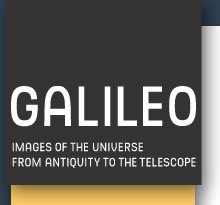


The astronomical discoveries that Galileo published encountered first the opposition, and later the outright hostility, of the ecclesiastical authorities. His dogged support of Copernicus' views was considered unacceptable in that it ran counter to Holy Scripture's assertions. Thus Galileo was reported to the Tribunal of the Inquisition for the first time in 1616, his trial ending in a warning to him to abandon his heliocentric position. He was reported to the authorities again in 1632 after publishing his Dialogue Concerning the Two Chief World Systems, a work that was openly Copernican in inspiration. This time the trial ended in Galileo's condemnation on the grounds of "vehement suspicion of heresy" and his dramatic abjuration before the Inquisitors. The event had an enormous impact both in Italy and in the rest of Europe, and it resulted in the Catholic Church's close monitoring of the protagonists of scientific research, and of their achievements.
Galileo’s abjuration
I, Galileo … seventy years of age, … kneeling before you Most Eminent and Most Reverend Cardinals Inquisitors … swear that I have always believed, I believe now, and with God's help I will believe in the future all that the Holy Catholic Church holds, preaches, and teaches. … I published a book in which I treat of this already condemned doctrine and adduce very effective reasons in its favour…; therefore, I have been judged [by the Holy Office] vehemently suspected of heresy. … Therefore desiring to remove from the minds of Your Eminences … this vehement suspicion … with a sincere heart and unfeigned faith I abjure, curse, and detest the above-mentioned errors and heresies, … and I swear that in the future I will never again say or assert, orally or in writing anything which may cause a similar suspicion about me. … I submit myself to all the penalties and punishments imposed and promulgated by the sacred canons ands other particular and general laws against similar delinquents … And in witness of the truth I have signed with my own hand the present document of abjuration and have recited it word for word in Rome, at the convent of the Minerva, this twenty-second day of June 1633.
I, Galileo Galilei, have abjured as above, by my own hand.